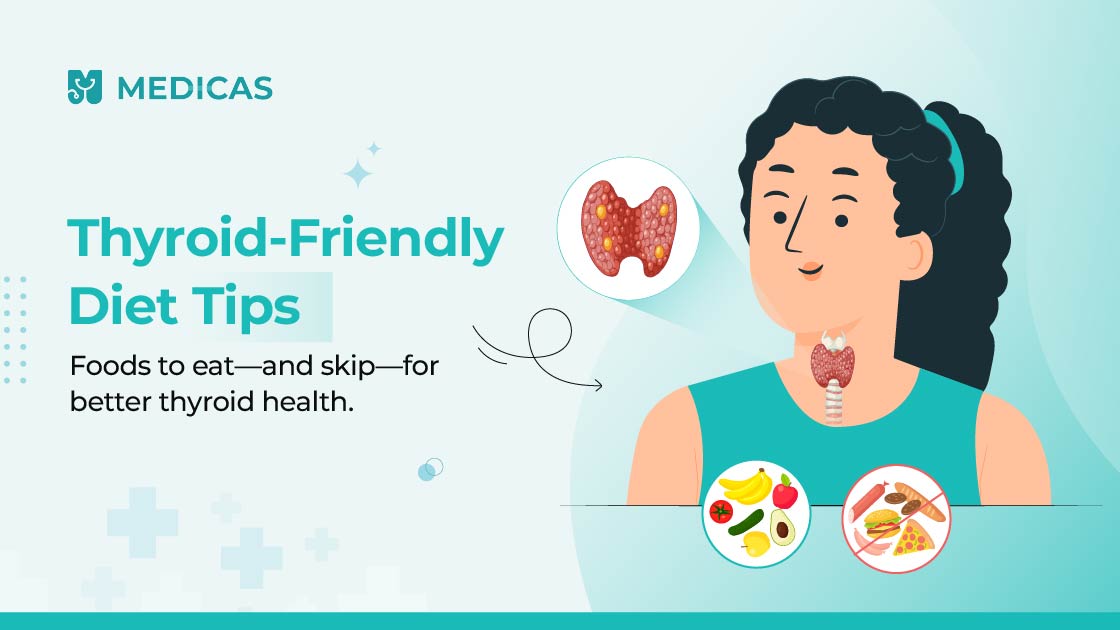Managing thyroid issues isn’t just about medication—what’s on your plate matters, too! Whether you’re dealing with hypothyroidism, hyperthyroidism, or just trying to support a healthy thyroid, the right thyroid diet can make a real difference. But with so much conflicting advice out there, it’s easy to feel overwhelmed.
Don’t worry—we’re here to break it down for you. In this blog, we’ll explore what to eat and avoid in thyroid, and why certain nutrients play a starring role in thyroid health. Let’s make your meals work for your metabolism, not against it!
Note: While this blog covers general thyroid nutrition, most of the dietary advice here is best suited for hypothyroidism, which is more common, especially among Indian women. Always consult a specialist before making major changes to your diet. You can also book an online doctor consultation to understand what applies to your condition.
Understanding Thyroid and Its Dietary Connection
The thyroid gland, a small, butterfly-shaped organ located at the base of your neck, is a powerhouse responsible for producing hormones (T3, T4) that regulate metabolism, energy levels, and numerous bodily functions. When this delicate balance is disrupted, leading to conditions like hypothyroidism (underactive thyroid) or hyperthyroidism (overactive thyroid), the impact can be far-reaching.
There are also temporary thyroid conditions like subacute thyroiditis, which can cause inflammation and hormonal fluctuations. If you’ve experienced sudden neck pain or unusual thyroid symptoms, you might want to explore Understanding Subacute Thyroiditis: Symptoms, Causes, and Treatment for deeper insights into this lesser-known but important thyroid condition.
While medication often forms the cornerstone of treatment, nutritional interventions can significantly complement medical management. Nutrients like iodine, selenium, zinc, and vitamins A and D are crucial for hormone synthesis and conversion. Conversely, certain foods interfere with hormone production or medication absorption, making a balanced hypothyroidism diet plan essential for thyroid patients.
Foods That Support Thyroid Function
The goal is to eat foods for thyroid patients that naturally nourish the gland, especially in cases of underactive thyroid.
| Nutrient | Food Sources | Benefit |
|---|---|---|
| Iodine | Seaweed (nori, kelp), fish (cod, tuna), dairy, eggs, iodized salt | Building block of T3/T4 hormones |
| Selenium | Brazil nuts, tuna, sardines, eggs, legumes, sunflower seeds | Converts hormones and acts as an antioxidant |
| Zinc | Oysters, beef, chicken, pumpkin seeds, lentils, chickpeas, whole grains | Supports hormone receptor sensitivity |
| Tyrosine | Cottage cheese, almonds, seeds, avocados, chicken, turkey, fish | Helps produce T3 and T4 hormones |
| Vitamin D | Morning sunlight, fortified dairy, fatty fish, egg yolk | Modulates immune response |
| Vitamin A | Carrots, sweet potatoes, spinach | Regulates thyroid-stimulating hormone (TSH) |
| Omega-3 Fatty Acids | Flaxseeds, walnuts, salmon | Reduces inflammation in thyroid tissue |
| Protein | Lentils, chicken, Greek yogurt | Essential for thyroid hormone transport |
| Iron | Spinach, dates, jaggery, pulses | Needed for proper thyroid function |
Some of the best vegetables for hypothyroidism include carrots, tomatoes, bottle gourd, green beans, and capsicum. These are not only easy to digest but also packed with antioxidants that help reduce inflammation and support thyroid function.
Incorporating such vegetables into your daily meal plan for thyroid problems is one of the most effective home remedies to naturally manage symptoms—especially when paired with regular physical activity and stress management.
Foods to Avoid if You Have Thyroid Problems
Certain foods can slow down thyroid hormone production—especially in hypothyroidism—when eaten in large quantities or raw.
| Food Category | Examples | Reason to Avoid |
|---|---|---|
| Goitrogens (raw) | Cabbage, broccoli, cauliflower | May inhibit iodine uptake (cook to reduce effect) |
| Soy Products | Tofu, soy milk, edamame, tempeh | Can interfere with the absorption of thyroid medication |
| Gluten-Containing Grains | Wheat, barley, rye | Can worsen autoimmune thyroid (Hashimoto’s) |
| Sugary and Processed Foods | Sweets, sodas, refined grains | Promote inflammation and weight gain |
| Excessive Fibre | Bran, large amounts of beans | Can bind medication and nutrients |
| Alcohol and Caffeine | Coffee, tea, spirits | May disrupt hormone levels and sleep |
Wondering, can thyroid patients eat cabbage or broccoli? The answer is yes—but cook them first. Steaming or sautéing cruciferous vegetables a few times a week is generally safe, especially if your iodine intake is adequate.
Sample Thyroid-Friendly Meal Plan
Here’s a practical thyroid food chart with meal suggestions that are both nutritious and easy to prepare.
| Time | Meal Suggestion |
|---|---|
| Early Morning | Thyroid medicine with plain water (empty stomach) |
| Breakfast | Moong dal chilla + mint chutney + green tea |
| Mid-Morning | A handful of pumpkin seeds or 1 boiled egg |
| Lunch | 1 multigrain roti + lauki sabzi + dal + carrot salad |
| Evening Snack | Roasted chana or mixed fruit bowl |
| Dinner | Vegetable soup + khichdi (brown rice + moong dal) |
| Bedtime | Warm turmeric-spiced almond milk (calcium-fortified) |
Adjust portions based on your caloric needs. For a customised plan, book an appointment with an endocrinologist.
Common Diet Mistakes Thyroid Patients Make
Many people unknowingly make mistakes while trying to follow a healthy thyroid diet.
-
Skipping iodine: Over-restricting without medical advice can worsen hypothyroidism.
-
Irregular meals: Skipping meals disrupts energy and medication timing.
-
Unnecessary gluten-free diets: Only required if there’s confirmed intolerance.
-
Falling for fad diets: Unsustainable and ineffective for chronic thyroid conditions.
-
Overuse of supplements: Excess selenium or iodine can be harmful.
-
Medication timing: Taking levothyroxine with coffee or fibre reduces absorption.
-
One-size-fits-all approach: Graves’ disease and Hashimoto’s require different plans. You can book an online consultation for tailored advice.
Conclusion
Thyroid issues can silently affect everything from weight and energy to fertility. A balanced diet supports treatment, improves well-being, and may prevent worsening of the condition. From incorporating iodine-rich foods for thyroid to avoiding common triggers, the right hypothyroidism diet plan empowers your recovery.
Don’t ignore your body’s signals. Book lab tests or try online doctor consultation through Medicas to manage thyroid health proactively.
Frequently Asked Questions (FAQs)
Which foods should be avoided with thyroid problems?
Avoid large amounts of raw goitrogenic vegetables (like cabbage and cauliflower), soy products, gluten (if sensitive), excessive fibre, and alcohol. Always cook cruciferous vegetables to reduce their goitrogenic effect.
Is coffee bad for thyroid patients?
Yes, coffee can interfere with the absorption of thyroid medications like levothyroxine. It’s best to wait at least 30–60 minutes after taking your medication before drinking coffee.
Are iodine-rich foods good for all thyroid conditions?
No. While iodine is essential for hypothyroidism, it can worsen hyperthyroidism or conditions like Graves’ disease. Always speak with your endocrinologist before increasing iodine intake.
Can diet alone manage thyroid issues?
Diet plays an important supportive role but is not a replacement for medication in most cases. A good thyroid diet can help manage symptoms and improve energy levels, but blood tests and follow-ups are essential.
Is milk good for thyroid patients?
Milk and dairy products are good sources of calcium and vitamin D, but avoid taking them too close to thyroid medication as they can interfere with absorption. Wait 30–60 minutes after taking medication before consuming dairy.
Disclaimer
Medical Advice: The information provided in this blog post is for educational purposes only and should not be considered as a substitute for professional medical advice, diagnosis, or treatment. Always consult with a qualified healthcare professional for personalized guidance regarding your specific medical condition.
Accuracy of Information: While we strive to provide accurate and up-to-date information, the field of medicine and viral fevers is constantly evolving. The content in this blog post may not reflect the most current research or medical guidelines. Therefore, it is advisable to cross-check any information provided with reliable sources or consult a healthcare professional.
Individual Variations: The symptoms, causes, treatment options, and preventive measures discussed in this blog post are general in nature and may not apply to everyone. It is important to remember that each individual’s situation is unique, and personalized medical advice should be sought when making healthcare decisions.
External Links: This blog post may contain links to external websites or resources for additional information. However, we do not endorse or have control over the content of these third-party websites. Accessing these links is done at your own risk, and we are not responsible for any consequences or damages that may arise from visiting these external sources.
Results May Vary: The effectiveness of treatment options or preventive measures mentioned in this blog post may vary from person to person. What works for one individual may not work the same way for another. It is essential to consult with a healthcare professional for personalized advice tailored to your specific needs.

Dr. Pratibha Shukla is a Diabetologist and Family Physician based in Mumbai, Maharashtra, with 8 years of clinical experience. She holds an MBBS, along with additional certifications including AFIH, PGDFM, CCEBDM, CCCS, and CCCMH, with a focus on diabetes care, family medicine, and occupational health. Dr. Shukla has worked with organizations such as ONGC, RCF Ltd., BARC Hospital, and under NHM programs, gaining experience in both clinical and community healthcare. Her expertise includes the management of diabetes, endocrine disorders, and chronic lifestyle diseases.


